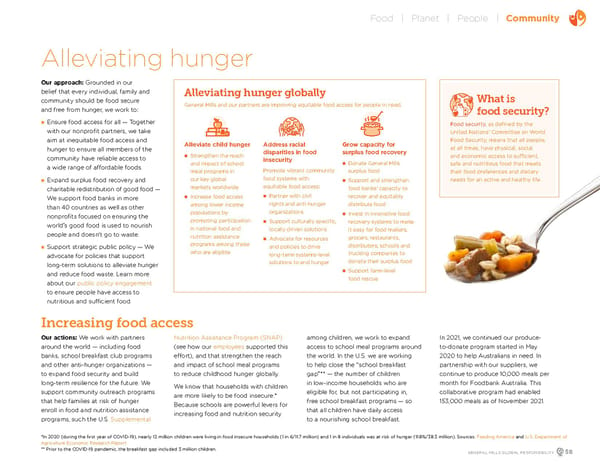Our approach: Grounded in our belief that every individual, family and community should be food secure and free from hunger, we work to: n Ensure food access for all — Together with our nonprofit partners, we take aim at inequitable food access and hunger to ensure all members of the community have reliable access to a wide range of affordable foods. n Expand surplus food recovery and charitable redistribution of good food — We support food banks in more than 40 countries as well as other nonprofits focused on ensuring the world’s good food is used to nourish people and doesn't go to waste. n Support strategic public policy — We advocate for policies that support long-term solutions to alleviate hunger and reduce food waste. Learn more about our public policy engagement to ensure people have access to nutritious and sufficient food. Alleviating hunger Alleviate child hunger n Strengthen the reach and impact of school meal programs in our key global markets worldwide n Increase food access among lower income populations by promoting participation in national food and nutrition assistance programs among those who are eligible Address racial disparities in food insecurity Promote vibrant community food systems with equitable food access: n Partner with civil rights and anti-hunger organizations n Support culturally specific, locally driven solutions n Advocate for resources and policies to drive long-term systems-level solutions to end hunger Grow capacity for surplus food recovery n Donate General Mills surplus food n Support and strengthen food banks’ capacity to recover and equitably distribute food n Invest in innovative food recovery systems to make it easy for food makers, grocers, restaurants, distributors, schools and trucking companies to donate their surplus food n Support farm-level food rescue General Mills and our partners are improving equitable food access for people in need. Alleviating hunger globally Our actions: We work with partners around the world — including food banks, school breakfast club programs and other anti-hunger organizations — to expand food security and build long-term resilience for the future. We support community outreach programs that help families at risk of hunger enroll in food and nutrition assistance programs, such the U.S. Supplemental Nutrition Assistance Program (SNAP) (see how our employees supported this effort), and that strengthen the reach and impact of school meal programs to reduce childhood hunger globally. We know that households with children are more likely to be food insecure.* Because schools are powerful levers for increasing food and nutrition security among children, we work to expand access to school meal programs around the world. In the U.S. we are working to help close the “school breakfast gap”** — the number of children in low-income households who are eligible for, but not participating in, free school breakfast programs — so that all children have daily access to a nourishing school breakfast. In 2021, we continued our produce- to-donate program started in May 2020 to help Australians in need. In partnership with our suppliers, we continue to produce 10,000 meals per month for Foodbank Australia. This collaborative program had enabled 153,000 meals as of November 2021. Increasing food access *In 2020 (during the first year of COVID-19), nearly 12 million children were living in food insecure households (1 in 6/11.7 million) and 1 in 8 individuals was at risk of hunger (11.8%/38.3 million). Sources: Feeding America and U.S. Department of Agriculture Economic Research Report ** Prior to the COVID-19 pandemic, the breakfast gap included 3 million children. What is food security? Food security , as defined by the United Nations’ Committee on World Food Security, means that all people, at all times, have physical, social and economic access to sufficient, safe and nutritious food that meets their food preferences and dietary needs for an active and healthy life. GENERAL MILLS GLOBAL RESPONSIBILITY 58 Food Planet People Community
 GeneralMills Global Responsibility Report Page 59 Page 61
GeneralMills Global Responsibility Report Page 59 Page 61